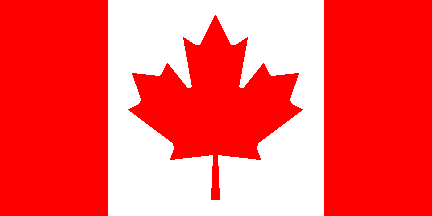Canada

Canada is a large and friendly country that offers opportunities for interested physics students to pursue quality post-graduate education in a variety of diverse environments. There are twenty-five universities offering post-graduate degrees in physics, with ~800 graduate students researching --- quite literally --- all areas of experimental and theoretical physics, both pure and applied. Any student interested in attending a graduate school in Canada could most certainly find a university offering a quality program in their field of interest. The availability of such diversity is also true of the United States and indeed graduate studies in the two countries are much more alike than they are different, especially on the global scale. I believe1 the only non-superficial differences are:
- Path to a Ph.D. Generally speaking, Canadian universities require that a doctoral candidate already possess an M.Sc. The latter entails 2--3 years of courses and research, culminating in a thesis which is often defended. With this experience, the student then has the option of continuing to pursue a Ph.D. --- which generally requires an additional 3-4 years of studies (with less emphasis on courses and more on research) --- or they can decide to enter the work-force with a strong M.Sc. degree. If they pursue their doctorate, they are able to switch schools, supervisors and/or fields. In some cases, if the student has a strong research and academic record during his/her M.Sc., the formal M.Sc. degree may be by-passed and the student may enter directly into a Ph.D. program.
- Financial considerations Canadian graduate students are required to pay tuition, which is becoming considerable in recent years: the country's average rose 4.3% to $5,475/year (CDN) last year, though some increases have been over 20% and tuition can go as high as $8,500/year. This may be starting to change, however, as some universities have begun adopting the laudable US approach of paying for a student's tuition. The financial support a typical student will get in Canada (through scholarships, teaching and/or research assistanceships) appears to be a little below what the same student would get at a US institution; coupled with the aforementioned cost for tuition, the overall difference is considerable. However, perhaps the largest factor determing a student's `effective salary' is the cost of living, which can vary considerably. In the end, what can be said generally is that the funding is reliable throughout a student's degree and, even in the more expensive cities in Canada, it is enough to live off of, i.e. though it is by no means an extravagant lifestyle, one does not need to get a part-time job or additional student loans to survive.
The Canadian government realizes the importance of physics research and has recently continued2 its level of funding, while other countries are facing significant cut-backs. This is good news for students because it means that, in addition to reliable support throughout their studies, Canada is aware of the benefits of physics research and is striving to continue to provide suitable funding to promote it. Some of the notable facilities for physics research in Canada include:
- The NRU reactor (Chalk River, ON)
Operating since 1957, this neutron facility has had many scientific achievements, including development of neutron scattering techniques to study condensed matter for which the 1994 Nobel Prize in Physics was awarded. - TRIUMF (Vancouver, BC)
With a long-standing reputation for cutting-edge research in nuclear, high-energy, medical and solid state physics, the new ISAC facility now allows physicists to probe the properties of and processes involving exotic nuclei far from the valley of stability.
- The Sudbury Neutrino Observatory (Sudbury, ON)
One of the deepest (cleanest) neutrino detectors in the world, it was instrumental in unravelling the solar neutrino puzzle and proving that neutrinos are not massless, and continues to probe neutrino physics. - The Canadian Light Source (Saskatoon, SK)
A 2.9 GeV synchrotron for research in medicinal, environmental, geological and advanced material sciences was recently commissioned (Oct 2004); it represents the largest investement in a large-scale Canadian facility since TRIUMF was constructed thirty years ago.
Job prospects for Canadian M.Sc. and Ph.D.s are very good, whether they choose to continue in academia or not: according to Statistics Canada, scientists earn some of the highest wages in Canada, and a study by the Canadian Association of Physicists found that unemployment is less than 1% for those with a graduate degree. The CAP survey also found that most graduates find employment in research & development (26%) and teaching (24%) positions, while others enter one of the many other career options open to them (computing, health sciences, financial and managerial positions, etc.); less than 3% of all graduates felt that their education in physics was not relevant to their employment. Post-doctoral positions in Canada and elsewhere are not too difficult to obtain; every graduate I personally know of that has decided to continue in research has found post-doctoral positions, with most taking the opportunity to go abroad (US, Japan and throughout Europe) in order to gain diversity in their research experiences. After one or two post-docs, one is generally in a position to apply for permanent employment at a university and/or research facility. As with most countries, there is greater competition for these permanent positions, though it is expected that opportunities will improve in the near future as baby-boomers retire and universities/facilities look to replace them with promising young scientists. As an incentive to retain Canadian scholars, preference is given to native or landed immigrant Canadians if equally qualified candidates are applying at a university or lab funded by the government.
Based on my personal experiences and from what I've heard from other Canadian graduate students, I feel it safe to say that the diversity and quality of education that Canada offers will provide a graduate student with an enjoyable experience and a respected post-graduate degree, one that opens doors for careers in both academia and industry.
Canadian Association of Physics www.cap.ca
- job openings: www.cap.ca/jobs
- education in Canada: www.cap.ca/edu
- departments by field: www.cap.ca/edu/gradProg
Research councils
www.nserc.ca
www.nrc.ca
1Having never attended a US university, there is some conjecture here ....
2Though on par with inflation, TRIUMF's funding was 20% less than requested this year, so we too are facing funding issues.

